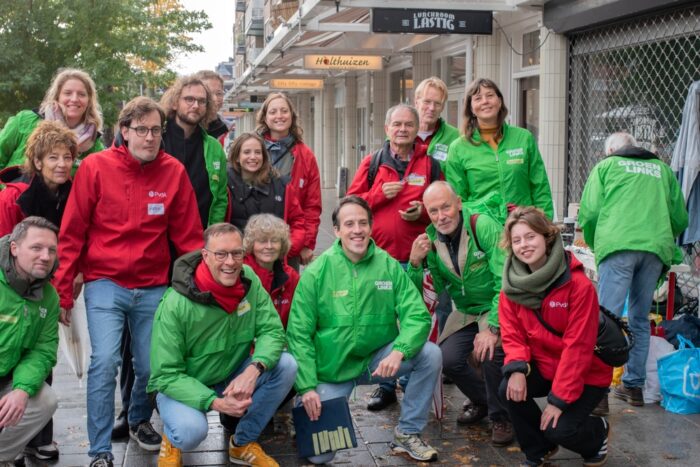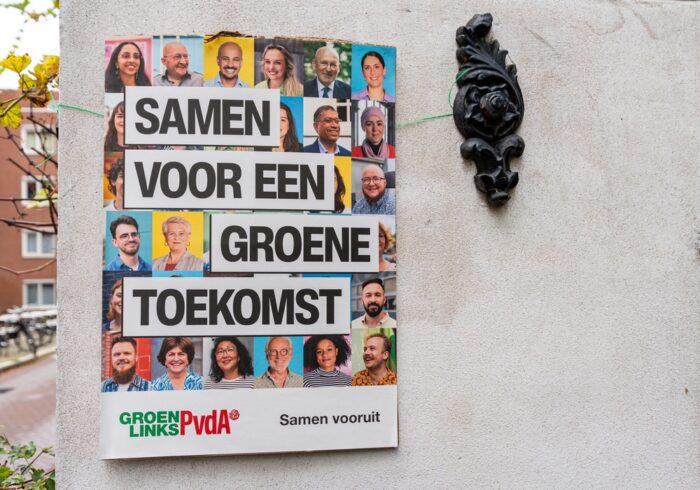The Progressive Post
Rebound of Social Democrats in Lithuania: reasons and implications

Last Sunday, Lithuanian Social Democrats scored an undisputed victory in the national legislative elections. Their dramatic rebound after crushing defeats in the previous two election cycles may offer certain insights into how the centre-left parties may fight back in East-Central Europe and elsewhere.
Under the leadership of MEP Vilija Blinkevičiūtė, Social Democrats were the clear winners of the elections to the Lithuanian Parliament (or Seimas) organised in two rounds on 13 and 27 October. In total, they received 52 MP seats out of 141, which is four times more than in 2020. It is the best performance in the party’s history in the 21st century, even outpacing the victory in 2000, when a centre-left coalition of four parties led by President Algirdas Brazauskas got 51 mandates.
The ruling centre-right Homeland Union-Lithuanian Christian Democrats (belonging to the EPP family) came a distant second with only 28 mandates, down from 50 seats won in 2020. Their two minor coalition partners also suffered losses. The Liberal Movement got 12 mandates, or one less than in 2020, while the pro-market and socially progressive Freedom Party was outvoted from Seimas.
In this regard, the so-called pendulum effect, when the voters’ support slides from the left to the right and back, was again clear, like in almost all other parliamentary elections since Lithuania regained independence in 1990. Despite tangible achievements during over three decades of independence, Lithuanian voters are still prone to punish every incumbent in four years.
Another important re-confirmed characteristic of the Lithuanian legislative elections is the emergence of completely new parties. This time, it was a new protest-populist party, ‘Dawn of Nemunas’, named under a major river of the Baltic Sea basin flowing through Lithuania. They got 20 mandates and took the third place. They were, in particular, successful in many constituencies in Western Lithuania. Their rise largely stems from the electoral appeal of its leader, Remigijus Žemaitaitis, who resigned from the Seimas in April 2024 after a ruling of the Constitutional Court that he violated the Constitution with a series of anti-semitic statements.
The biggest losers of the elections were the centrist-populist Farmers and Greens, led by agro-tycoon Ramūnas Karbauskis, who crushed Social Democrats in 2016, and had the biggest parliamentary faction in opposition after 2020. This time, they collected only 8 mandates or 24 less than in previous elections. Their popularity sharply dropped at the end of 2021, when their former Prime Minister (2016-2020) Saulius Skvernelis left the party and created his own: the Union of Democrats ‘For Lithuania’.
The latter force, belonging to the European Greens, got 14 mandates and is most likely a coalition partner for Social Democrats. Severely weakened Karbauskis is another possible ally, although his and Skvernelis’s mutual animosity could hijack the negotiations. Anticipating this, Social Democrats declared that they are also open to talks with both the Liberal Movement and the Dawn of Nemunas. The inclusion of the Liberals, however, may create serious obstacles in turning Lithuania’s economy to the left, while cooperation with the Dawn of Nemunas would be frowned upon by the international partners whose support for Lithuania is of critical importance amid geopolitical tensions.
The rise of living costs, underfunding of public services and their gradual privatisation, and social exclusion acutely felt in the countryside were among the top concerns debated in the election campaign. Likewise, the national security and issue of increasing defence expenditure up to 4 per cent of GDP in the wake of Russia’s military aggression against Ukraine were also widely debated. Some of the party lists tried to spread ideas originating from the Kremlin’s communication playbook, but they failed to attract people’s support. While the leader of the Dawn of Nemunas also did not shy away from certain controversial statements, they were foremost directed at exploiting anti-elite sentiments of disenchanted voters rather than oriented to promoting an anti-Western narrative within the society.
Concerning the comeback of Social Democrats after crushing defeats in two previous parliamentary elections in 2016 and 2020, one can list four key factors:
First, internal democratisation reforms within the party after the 2016 electoral defeat, including the introduction of the election of the party leader by all members of the party, as well as a brave decision to exit the ruling coalition headed by the populist Farmers and Greens in 2017, which allowed the party to avoid its dilution;
Second, the ability to retain the party unity after the split of the parliamentary faction in half following the exit from the ruling coalition in 2017. While two former party leaders and former PMs, as well as other influential MPs, left the party, not a single mayor or other key local party leaders followed suit, and thus, party infrastructure on the ground has largely remained intact. Meanwhile, the split of the Farmers and Greens after the parliamentary elections in 2020 helped LSDP to take back its previous status of a most formidable opponent of the ruling Homeland Union-Lithuanian Christian Democrats.
Third, the personal charisma of LSDP leader MEP Vilija Blinkevičiūtė, elected in 2021, clearly invigorated Social Democrats’ electoral chances. From the moment she was elected party leader in May 2021, the party’s popularity embarked on a steady rise.
Fourth, out of 52 mandates, 34 were gained in single-mandate districts. Social Democrats won around 90 per cent of run-offs where they competed. They were successful both in major towns (like the second biggest city Kaunas) and in rural areas. In this regard, Social Democrats realised their two competitive advantages. On the one hand, voters perceived them as the most real alternative to replace the incumbents. On the other hand, taking rather moderate positions on many divisive issues helped Social Democrats retain quite favourable evaluations by most supporters of other parties.
A historic rebound of the Lithuanian Social Democrats also means a great responsibility for them to prove to voters that their support was not in vain. Given a rather complicated external economic and geopolitical situation, that would be of enormous challenge.
Photo credits: Wikicommons




